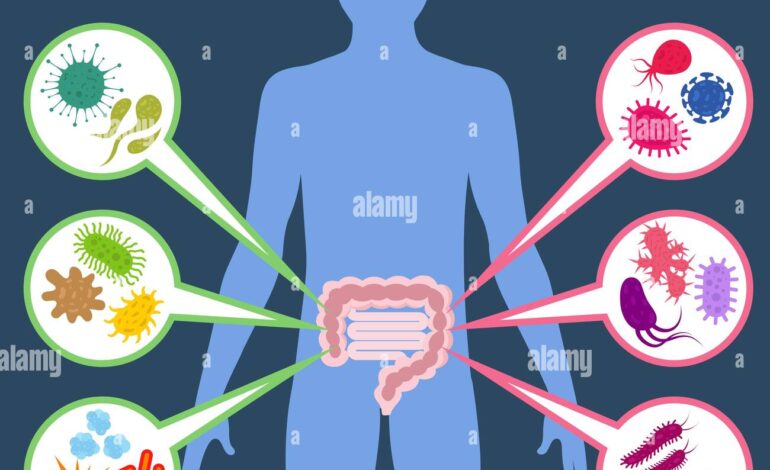The Gut-Microbiome Connection: Your Guide to a Healthy Gut

Understanding Your Gut: A Deep Dive into Gut Health and the Microbiome
For years, we’ve heard whispers about “gut feeling” and the connection between our digestive system and overall well-being. It turns out those whispers are far more than just intuition; they’re rooted in a rapidly expanding field of scientific understanding – the fascinating world of gut health and the microbiome.
What is the Gut Microbiome?
Let’s start with the basics. Your gut microbiome is essentially a bustling ecosystem residing within your digestive tract, primarily in your large intestine (colon). It’s comprised of trillions of microorganisms – bacteria, viruses, fungi, and archaea – collectively weighing around 2-5 pounds! Think of it as an internal rainforest teeming with life.
Diversity is Key: The health of this ecosystem isn’t just about the number of microbes; it’s about *diversity*. A vibrant microbiome boasts a wide range of different species, each playing a unique role. Like any good ecosystem, this diversity ensures stability and resilience. A less diverse microbiome can be more vulnerable to disruptions and imbalances.
Why is Gut Health So Important?
So, why should you care about the tiny inhabitants of your gut? The answer is: they impact nearly every aspect of your health! Here’s a breakdown of some key areas:
- Digestion and Nutrient Absorption: This is perhaps the most obvious role. Gut bacteria help break down complex carbohydrates that our bodies can’t digest on their own, like fiber. They also synthesize essential vitamins (like K and B vitamins) which we absorb and utilize for various bodily functions.
- Immune System Regulation: A staggering 70-80% of your immune system resides in your gut! The microbiome interacts with the immune system, training it to distinguish between friendly bacteria and harmful pathogens. A healthy microbiome helps prevent autoimmune diseases and reduces inflammation throughout the body.
- Brain Health – The Gut-Brain Axis: This is where things get really interesting. There’s a direct communication pathway between your gut and your brain, often referred to as the “gut-brain axis.” This bidirectional connection involves nerves (the vagus nerve being a major player), hormones, neurotransmitters, and even immune signals. Gut bacteria can influence mood, anxiety levels, cognitive function, and even neurological disorders like Parkinson’s disease.
- Metabolism & Weight Management: The microbiome plays a role in metabolism and how our bodies process food. Certain bacterial species are linked to increased fat storage, while others help regulate appetite and improve insulin sensitivity. Imbalances can contribute to obesity and metabolic syndrome.
- Protection Against Pathogens: A healthy gut microbiome acts as a barrier against harmful bacteria like Salmonella and E. coli. Friendly bacteria compete for resources and produce antimicrobial substances that inhibit the growth of pathogens, preventing infections.
Factors That Affect Gut Health
Unfortunately, our modern lifestyle often throws this delicate ecosystem out of balance. Here’s what can disrupt your gut microbiome:

- Diet: A diet high in processed foods, sugar, and unhealthy fats feeds the “bad” bacteria while starving the beneficial ones. A diet low in fiber drastically reduces the food source for good bacteria.
- Antibiotics: While antibiotics are life-saving medications, they indiscriminately kill both harmful *and* beneficial bacteria, leading to a significant disruption of the microbiome.
- Stress: Chronic stress can alter gut permeability (leaky gut) and negatively impact bacterial composition.
- Lack of Sleep: Sleep deprivation has been linked to shifts in the gut microbiome and increased inflammation.
- Environmental Toxins: Exposure to pesticides, herbicides, and other chemicals can harm beneficial bacteria.
- Medications (Beyond Antibiotics): Certain medications like NSAIDs (ibuprofen) and proton pump inhibitors (PPIs for acid reflux) can also impact gut health.
Tips for Improving Your Gut Health
The good news is, you *can* take steps to nurture your gut microbiome! Here are some practical tips:
- Eat a Fiber-Rich Diet: Load up on fruits, vegetables, whole grains, legumes (beans, lentils), and nuts. Fiber acts as the primary food source for beneficial bacteria. Aim for at least 25-30 grams per day.
- Include Fermented Foods in Your Diet: Fermented foods like yogurt (look for live cultures!), kefir, sauerkraut, kimchi, kombucha, and miso are rich in probiotics – live microorganisms that can replenish your gut flora.
- Consider a Probiotic Supplement: While food sources are ideal, probiotic supplements can be helpful, especially after antibiotic use or during periods of stress. Important note: Different strains of bacteria have different effects. Do some research to find a strain appropriate for your specific needs (e.g., Lactobacillus and Bifidobacterium are common and well-studied). Always consult with a healthcare professional before starting any new supplements.
- Prebiotics are Your Friend: Prebiotics are non-digestible fibers that *feed* the probiotics already in your gut. Good sources include onions, garlic, leeks, asparagus, bananas (slightly green ones), and oats.
- Manage Stress: Incorporate stress-reducing techniques like meditation, yoga, or spending time in nature.
- Prioritize Sleep: Aim for 7-9 hours of quality sleep each night.
- Limit Processed Foods & Sugar: Reduce your intake of refined sugars, processed foods, and unhealthy fats to starve the “bad” bacteria.
- Stay Hydrated: Water is essential for overall health, including gut health.
Looking Ahead – The Future of Gut Health Research
The field of gut microbiome research is still in its early stages, but the potential implications are enormous. We’re seeing increasing interest in personalized nutrition based on individual microbiome profiles – tailoring diets to optimize bacterial populations for specific health outcomes. Researchers are also exploring fecal microbiota transplantation (FMT) as a treatment for various conditions, although this remains largely experimental.
Conclusion: Taking care of your gut is taking care of *yourself*. By understanding the vital role of your microbiome and implementing these simple lifestyle changes, you can pave the way for improved digestion, enhanced immunity, better mental health, and a greater sense of overall well-being. Your gut deserves attention – it’s a key player in your journey to optimal health!




2 Comments
World’s First DeepSeek AI App
Creates Automated Viral News Website
With Lifelike AI News SpokesPerson
In Less Than 60 Seconds…
TRY IT NOW! https://hamsterkombat.expert/AINewsAvatar
Hi Business Owner of everydaynewsworld.com,
Want to skyrocket sales quickly? Get 8 million B2B/B2C leads for just $6 (40% off from $10)!
Perfect for resellers.
High-conversion potential.
Bonus: Free cold email guide ($20 value).
Only 50 slots available, exclusively for the first 50 buyers! Hurry, the 51st buyer pays $75 – Don’t miss out!
Use BUYNOW when checkout: https://cutt.ly/SrjAVyss (VowLeads)
Grab your leads now!
P.S. The price jumps to $75 after the slots run out. Act now!
Regards,
Matthew Bunn
Unsubscribe here: https://tayupdates.com/unsubscribe/?d=everydaynewsworld.com
Address: 1968 S. Coast Hwy #3961, Laguna Beach, CA 92651